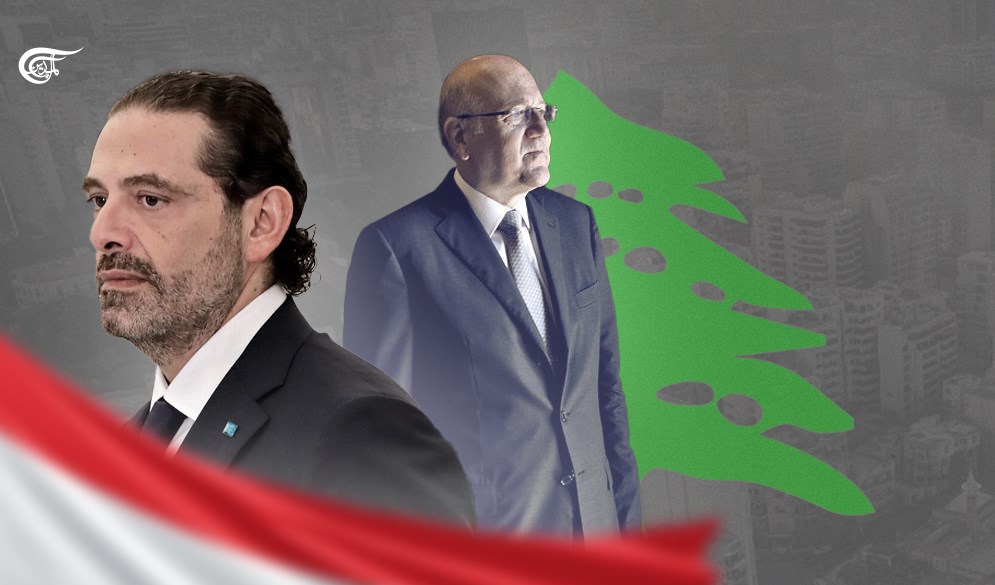Do Foreign Powers Want a Government in Lebanon Today?
Reliable sources have confirmed that France wants a government as soon as possible, one that can guarantee three principle things for it.
-

The primary obstacle that prevented Hariri from forming the government is non-existent for Mikati.
Many wind up believing the lies they tell, ignoring, in terms of forming the Lebanese government (or impeding its formation), all internal and external talk of the Saudis' refusal of a government presided by Saad Hariri. Instead, they continue to talk of internal obstacles and of swapping ministers here or there, which impeded the formation of a government for nine months.
When studying the odds of formation as far as the PM-designate is concerned, we need to dust off the many lies that have piled over the primary reason that has prevented Hariri from forming the government: France, Egypt, and Turkey have all asked Hariri to go ahead and pushed him in that direction, and at the same time, the President and the Free Patriotic Movement (FPM) made one concession after the other. It even got to the point where they made ten concessions to help him form; yet, he did not, for the sole reason that he received no Saudi signal that would allow him to do so.
This primary obstacle that has prevented Hariri from forming is non-existent for the new PM-designate. Mikati is not Hariri - the hated in the eyes of Saudi Arabia - and neither is the latter the great power Mikati cannot breathe without.
Mikati is considerate to Saudi Arabia, tries not to displease it, and would never do anything to provoke it. However, (in contrast to Hariri) he never waited for its signals in his political career. On the other hand, the Kingdom has no veto against "a Mikati government" as it did with Hariri in terms of possible cooperation and finds nothing provoking about Mikati as it did with Hariri, which leads us to say that the first and primary reason that prevented Hariri from forming the government is non-existent today.
The second obstacle that worried Hariri was the removal of subsidies and the severe basket of procedures, which the international community calls reforms, that would have a huge impact on the regular citizen. Most of these procedures are now a fait-accompli, and the Mikati government must work on reducing their severity.
As for the traditional obstacles, such as ministerial quotas and the form of Hezbollah's representation , these are all minor details that Mikati can find speedy settlements for, should an international decision to form a government exist. These settlements were never a reason to delay the formation or veto it, but they were mere tools used by the local forces waiting for external signals. Most importantly, Mikati is more capable here than anyone else in resolving issues and finding a middle ground that can please everyone, again if there is a definite international decision to form.
The question here is, do foreign powers want a government in Lebanon today?
Diplomatic and political intel from multiple reliable sources confirms that France wants a government as soon as possible, one that can guarantee three principle things for it:
1- Quick cash for its companies: the French President is late in delivering on the promises he made for major companies benefiting from the "Cedre" finances, which the Lebanese people are borrowing, only for the money to be rerouted to French companies for projects (that no one knows if they are truly necessary). It should be noted that the French Foreign Ministry has for years been reduced to no more than a PR employee looking for projects for French companies.
2- An attempt to close in on Russia's advances in the region: France and Germany notice that the US is withdrawing from the region and that Russia is investing heavily in Iraqi oil, coupled with its exceptional military presence in Syria and a unique drive towards Lebanon, the first of its kind.
3- Stop the security collapse because of its dangerous political repercussions in terms of Hezbollah's endurance, the collapse of all other forces, and the loss of the West's substantial financial investments in the army and security forces.
An additional explanation is necessary here: The French and their international partners do not want a security collapse, but they do want the financial and services collapse to continue, at least until the next parliamentary elections. The US allies' electoral program consists of only one thing: "hunger, poverty, and humiliation." They are working hard to pin this on Hezbollah and the FPM so that they can reap its electoral benefits in the FPM's areas. If they lose this one thing, they have nothing to base their coming elections on.
The unavailability of raw materials in the Lebanese market, under the direct, close supervision of the Central Bank, will definitely continue, with or without a government. Moreover, not giving depositors their money back, with or without a government, will also continue, and so will the surge in living expenses closely tied to the dollar exchange rate. The cries over the unavailability of medicines need to grow louder now that the pictures of children, the ill, and the elderly have become prime election material.
As such, they want the government to sign deals with them that would allow their companies to get their hands on money for long-term projects that add nothing to people's lives or living conditions (more useless roads and bridges and dysfunctional treatment plants). They want a government that can put an end to the feeble attempts of some ministers to secure alternative solutions for the unavailability of medicine, electricity, and some foodstuffs. They want a government that can put an end to the Russian ambitions in the port, refineries, and oil. They want a government that would borrow more money to spend on futile projects without any serious work in accounting books, quality of execution, or economic feasibility studies, whilst threatening those who try to impede or modify these dangerous goals behind the formation with silly European sanctions.
In the end, the government will likely be formed: the foreign powers want a government. Hezbollah and its allies (except for the Strong Lebanon Bloc) have all supported designating Mikati and voted for him. The President respects the constitution in terms of cooperating with the person designated by the parliamentary majority, whomever that may be.
Both the President and the FPM will not shoulder the responsibility of standing in the way of all the aforementioned. However, they will prepare for the elections, in their own way, letting the majority that named Mikati shoulder the responsibility for everything his government might do, taking advantage of the opportunity that enables them to finally show that they do not have a parliamentary majority, nor a cabinet majority, nor a power majority. The President and the FPM had some suspicions, but their conviction today is definite and firm: we cannot turn the table, so the least we can do is not sit at it.

 Ghassan Saoud
Ghassan Saoud
 7 Min Read
7 Min Read







